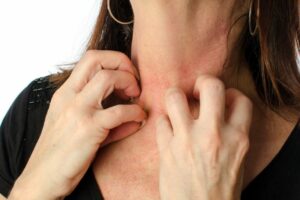Welcome to our comprehensive guide on managing formication during menopause. Formication, the sensation of crawling, tingling, or itching on the skin, can be a challenging symptom for many women experiencing menopause. While it may not be as widely discussed as other menopausal symptoms, it can significantly impact one’s quality of life. In this blog, we’ll explore what formication is and most importantly, effective formication menopause treatments to alleviate this discomfort.
Contents
What Is Formication Menopause?
 Formication during menopause refers to the sensation of crawling, tingling, or itching on the skin, often likened to the feeling of ants or insects crawling beneath the surface. The term “formication” is derived from the Latin word “formica,” meaning ant, aptly capturing the unsettling nature of this sensation. This phenomenon commonly occurs in women undergoing menopause, a natural biological transition marked by the cessation of menstruation and hormonal fluctuations.
Formication during menopause refers to the sensation of crawling, tingling, or itching on the skin, often likened to the feeling of ants or insects crawling beneath the surface. The term “formication” is derived from the Latin word “formica,” meaning ant, aptly capturing the unsettling nature of this sensation. This phenomenon commonly occurs in women undergoing menopause, a natural biological transition marked by the cessation of menstruation and hormonal fluctuations.
While not as widely recognized as other menopausal symptoms, such as hot flashes or mood swings, formication can significantly impact the daily lives and overall well-being of those experiencing it. The exact cause of menopausal formication is thought to be linked to hormonal changes. Particularly the decline in estrogen levels. This can affect nerve sensitivity and skin health.
What Are The Holistic Formication Menopause Treatments?
Holistic treatments for menopausal formication involve addressing the symptoms from a comprehensive perspective that considers lifestyle, nutrition, and alternative therapies. While individual responses may vary, here are some holistic approaches that some women find beneficial:
Herbal Remedies and Supplements
Herbal remedies and supplements can be considered as part of a holistic approach to address menopausal formication. Evening primrose oil, for example, contains gamma-linolenic acid (GLA), which may have anti-inflammatory properties and support skin health. Black cohosh, a traditional herbal remedy, is believed to influence hormonal balance and alleviate menopausal symptoms. Omega-3 fatty acids found in fish oil or flaxseed oil may also contribute to skin health and reduce inflammation.
Acupuncture and Traditional Chinese Medicine (TCM)
Acupuncture, a key element of Traditional Chinese Medicine, involves the insertion of thin needles into specific points along the body’s meridians. This practice is believed to restore the balance of vital energy, or Qi, within the body. Some women report relief from menopausal symptoms, including formication, after undergoing regular acupuncture sessions. TCM may also include herbal remedies and dietary recommendations tailored to address imbalances contributing to skin discomfort during menopause.
Mind-Body Practices
Mind-body practices, such as yoga, tai chi, and meditation, offer holistic benefits for managing menopausal formication. These activities focus on integrating the mind and body, promoting relaxation, and reducing stress. Stress reduction is particularly important since heightened stress levels can exacerbate menopausal symptoms. Regular practice of these mind-body techniques may contribute to hormonal balance and positively influence the nervous system, potentially leading to a reduction in the intensity of formication sensations.
Dietary Adjustments
Dietary adjustments play a crucial role in holistic menopausal care. A well-balanced diet rich in antioxidants, vitamins, and minerals supports overall health and skin function. Foods like berries, leafy greens, whole grains, and fatty fish can provide essential nutrients. It’s advisable to limit the consumption of caffeine, alcohol, and spicy foods, as they may trigger or worsen skin sensations. Staying hydrated is equally important for skin health, and incorporating these dietary changes into your daily routine can contribute to an overall sense of well-being.
Essential Oils
Essential oils, known for their aromatic and therapeutic properties, can be part of a holistic approach to managing menopausal formication. Lavender, chamomile, and peppermint oils are popular choices due to their calming and soothing effects. Diluted essential oils can be applied topically to the affected areas or added to a warm bath for a relaxing experience. However, it’s essential to perform a patch test before widespread use, as some individuals may be sensitive to certain oils.
Regular Exercise
 Engaging in regular physical activity is a holistic approach that benefits both physical and mental well-being during menopause. Exercise promotes blood circulation, which is vital for skin health, and contributes to hormonal balance. Whether it’s brisk walking, cycling, or yoga, incorporating exercise into your routine can help reduce stress, enhance mood, and potentially alleviate the intensity of formication sensations. Consult with a healthcare professional before starting any new exercise program, especially if you have pre-existing health conditions.
Engaging in regular physical activity is a holistic approach that benefits both physical and mental well-being during menopause. Exercise promotes blood circulation, which is vital for skin health, and contributes to hormonal balance. Whether it’s brisk walking, cycling, or yoga, incorporating exercise into your routine can help reduce stress, enhance mood, and potentially alleviate the intensity of formication sensations. Consult with a healthcare professional before starting any new exercise program, especially if you have pre-existing health conditions.
Hydration and Cooling Measures
Adequate hydration is essential for skin health and overall well-being. Drinking enough water helps maintain skin elasticity and may reduce the irritation associated with formication. Additionally, using cooling measures such as cold compresses or cool baths can provide relief by soothing the skin and minimizing discomfort. Be mindful of skincare products and choose those with gentle, hydrating ingredients. Avoiding hot showers and opting for cooler water temperatures can also contribute to a more comfortable experience for individuals dealing with menopausal formication.
It’s essential to approach holistic treatments with an awareness of individual differences and consult with healthcare professionals before making significant changes. Integrating these holistic strategies into a comprehensive wellness plan may offer relief for some women experiencing formication during menopause.
Should I Consider Medical Formication Menopause Treatments?
Whether or not to consider medical treatments for menopausal formication is a decision that should be made in consultation with your healthcare provider. Medical interventions may be recommended based on the severity of your symptoms, their impact on your daily life, and other factors unique to your health situation. Here are some medical formication menopause treatments that may be considered:
Topical Treatments
Your healthcare provider may prescribe or recommend topical treatments such as creams or lotions containing ingredients like corticosteroids or menthol. These can provide localized relief by soothing the skin and reducing irritation associated with formication.
Hormone Replacement Therapy (HRT)
Hormone replacement therapy involves the administration of hormones, typically estrogen and sometimes progesterone, to address the hormonal imbalances associated with menopause. HRT has been shown to alleviate various menopausal symptoms, including skin-related issues. However, it comes with potential risks and side effects. So the decision to undergo HRT should be carefully discussed with your healthcare provider.
Prescription Medications
In some cases, your healthcare provider may prescribe medications to address nerve-related symptoms, such as anticonvulsants or certain antidepressants. These medications may help modulate nerve signals and reduce sensations like tingling or crawling on the skin.
Dermatological Assessments
If there is uncertainty about the cause of the skin sensations, your healthcare provider may recommend a dermatological assessment. Skin conditions such as dermatitis or allergies could contribute to the symptoms, and targeted treatments may be prescribed based on the dermatologist’s findings.
Collaborative Approaches
Your healthcare provider may adopt a collaborative approach, working with specialists such as dermatologists or neurologists to determine the most effective treatment plan. This approach ensures that all potential contributing factors to menopausal formication are thoroughly evaluated and addressed.
Before pursuing any medical treatment, it’s important to have a thorough discussion with your healthcare provider. Considerations such as your overall health, medical history, and potential risks and benefits of each treatment option will be taken into account. Additionally, keep your healthcare provider informed about any complementary or alternative therapies you may be exploring. This helps to ensure a comprehensive and coordinated approach to managing menopausal formication.
How Long Does Menopause Formication Last?
 The duration of menopausal formication, the sensation of crawling, tingling, or itching on the skin, can vary widely among women. For some individuals, these symptoms may be transient, lasting only for a short period during the menopausal transition. In contrast, others may experience formication for an extended duration, persisting throughout the entire menopausal phase or even beyond. The intensity and frequency of formication can also fluctuate over time, influenced by factors such as hormonal changes, stress levels, and overall health.
The duration of menopausal formication, the sensation of crawling, tingling, or itching on the skin, can vary widely among women. For some individuals, these symptoms may be transient, lasting only for a short period during the menopausal transition. In contrast, others may experience formication for an extended duration, persisting throughout the entire menopausal phase or even beyond. The intensity and frequency of formication can also fluctuate over time, influenced by factors such as hormonal changes, stress levels, and overall health.
It’s important to note that while some women find relief from formication as they progress further into postmenopause, others may continue to experience these sensations, albeit to a lesser degree. The menopausal journey is highly individual, and there is no fixed timeline for how long formication will last.
It is recommended that women experiencing persistent or bothersome symptoms consult with their healthcare providers to explore appropriate management strategies. Regular communication with a healthcare provider ensures ongoing support and adjustments to the treatment plan, if necessary, to enhance overall well-being during and after the menopausal transition.
Conclusion
In conclusion, menopausal formication treatments involve understanding its causes and adopting a holistic approach to find relief. From herbal remedies and acupuncture to mindful practices like yoga and dietary adjustments, there are various strategies to explore. It’s crucial to remember that each woman’s experience is unique, and what works for one may differ for another. Consultation with healthcare professionals can provide personalized guidance, considering factors like overall health and potential medical interventions.
By embracing a comprehensive and individualized approach, women can navigate menopausal formication with confidence. Thus, seeking relief and enhancing their overall well-being during this transformative phase of life. If you are facing menopause-related issues, menopause treatment at HerMantra can help. Book your free trial online menopause treatment session now.


